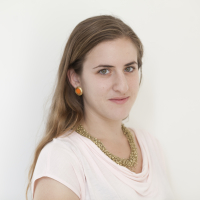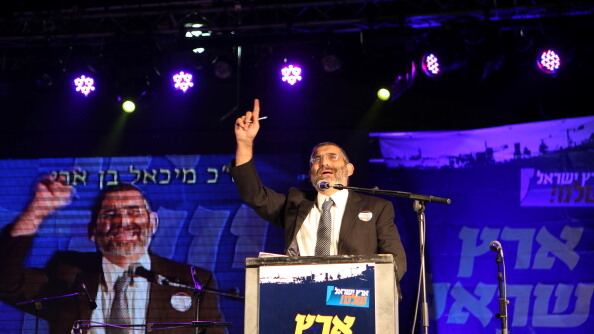I met four 18-year-olds at the third annual “Conference for the Application of Israeli Sovereignty Over Judea and Samaria” yesterday: Noah, Hallel, Sarah, and Lilach. Three of them do national service together in Kiryat Arba, a settlement nestled right next to the ancient city of Hebron. They were excited: they were voting for the first time. I was nervous: who were they voting for? As it turned out, they were debating just that. And their debate was totally unremarkable.
The conference was huge—there were some 800 people there. I overheard one of the organizers telling people they couldn’t go in; they had to allow those who had registered weeks ago to take their seats first. The venue was beautiful—a fancy conference hall in a modern, well-lit Bayit Vagan hotel. And the food was abundant: coffee, juice, and pastries lined the hallways. If you wanted one, you could get a set of headphones that would provide you with simultaneous translation, and there were no shortage of those who took advantage of this—a majority of attendants were American immigrants. If I were a politician, I would have felt honored to speak here, and I would have hoped they ask me every year.

When I asked Noah and Hallel who they were going to vote for, they were pretty sure: Naftali Bennett’s Jewish Home. Sarah, and Lilach who I talked to later (I remembered her from the Kahane memorial a few weeks ago), were both torn between the Jewish Home and Strong Israel. Let me explain what I think their consideration was about.
A bit of background: Towards the end of this year, the National Union Party, a coalition of four tiny right-wing nationalist parties—Moledet, Hatikva, Eretz Yisrael Shelanu, and Tkuma—broke up. Moledet and Tkuma merged with Naftali Bennet’s Jewish Home and Hatikva (Arieh Eldad) and Eretz Yisrael Shelanu (Michael Ben Ari) formed a new party, which is a replica of Meir Kahane’s Kach in all but name (and tiny bits of its platform). It’s called Strong Israel.
So to put all of this in a little more context, the choice these girls were facing was between the following: On the one hand, Naftali Bennett’s party, represented at the conference by his number four, Rabbi Eli Ben Dahan, one of the hangers-on from the National Union merger, a student of Rav Tzvi Yehuda Kook who's flatly against same-sex marriage, who ran the Rabbinical court system for 20 years, thinks it’s time to repeal Oslo, but who is otherwise considered fairly liberal on social issues. In other words, old hat religious racism, but still land-maximizing (a safe, if banal choice). And on the other hand, Michael Ben Ari, who recently tried to burn a Palestinian flag, attempted to appeal a Supreme Court ban on one of his campaign ads (“Loyalty—No Rights Without Duties”), and, according to Foreign Policy, carries a copy of Meir Kahane’s biography around with him. In other words, another sensible option land-wise, but sometimes not so media-friendly (fascist tendencies and all). All of this is to say that, for these girls, both of these options are run-of-the-mill: the choice is about which right feels right.
Lilach said she didn’t like some of the people on Bennett’s list, naming moderates Uri Orbakh and Nissan Slomiansky and implying they were too soft. But she did like Ben Dahan: she said he made her rethink the “triangle.” (What she meant by “the triangle” was the Bnei Akiva trifecta-cum-mantra: “The People of Israel, the Land of Israel, according to the Torah of Israel”.) The thrust of Ben Dahan’s talk had been to prioritize the Land of Israel over the Nation of Israel. Lilach said she had never heard anyone do this before, and she liked it. And when I asked her, this very normal girl with whom I felt I had sparked something of a friendship, at this very normal conference (third year running!) if she thought we should sacrifice the People of Israel for the Land of Israel, her answer was nonchalant: “Yeah. That makes sense to me.” “Oh,” I said, and ate some more pastry.
These girls were just doing what politically engaged 18-year-olds do all across the world; they were getting excited to vote. Only their choices ranged from ultra-nationalist with a dash of religion to uber-ultra-nationalist with a dollop of doctrine. So it was with Ariel Anbar, a student at the Interdisciplinary Center in Herzliya studying politics. A rakish 19-year-old with a quick smile, his ideas were closer to those of Feiglin and Ben Ari’s than Naftali Bennett’s. He told me his “comprehensive plan” for Israel was “to apply Israeli sovereignty over all areas (A, B, C), and…pay them [Palestinians] to leave.” When I asked what would happen if they should decide not to take the money, he said, “if they won’t leave, we have to do what the Torah says, we have to kick them out.” At that point I knew, I had heard these tropes before: “What do you think of Meir Kahane?” I asked. He replied, “Meir Kahane is my ideological hero.” “Do you think there are a lot of people here who are like you, followers of Kahane?” “Yeah,” he said.






